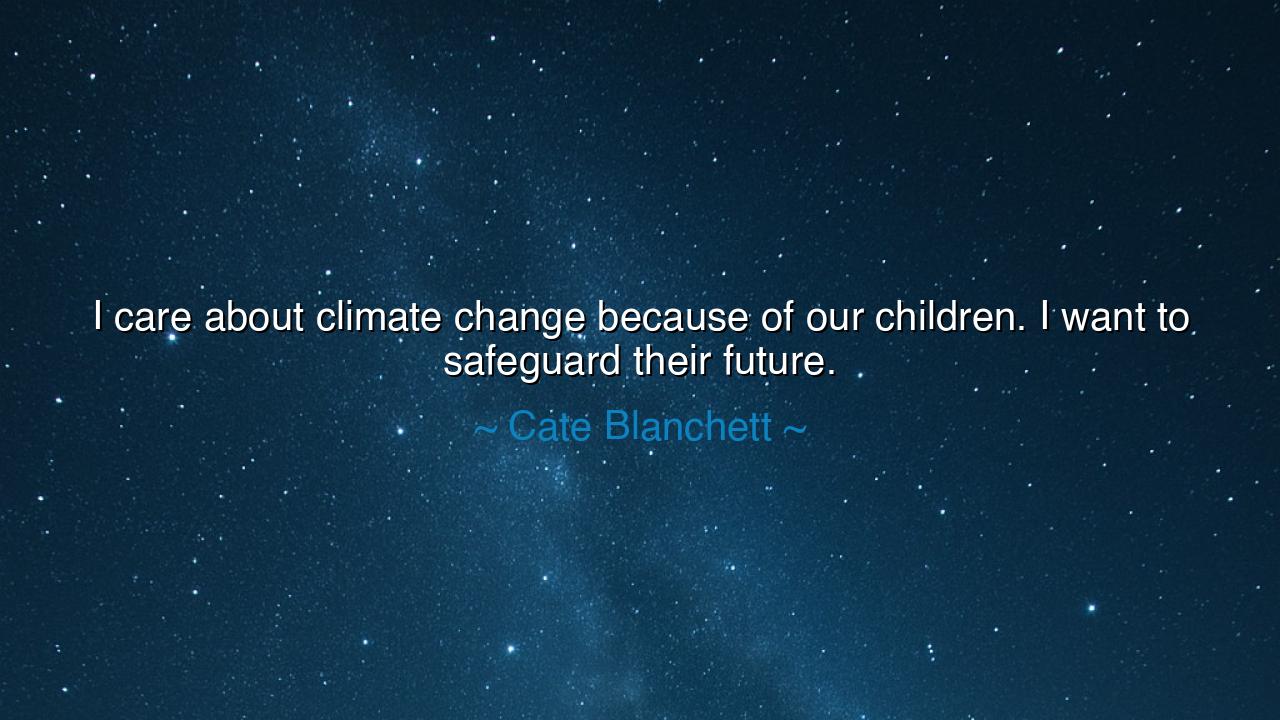
I care about climate change because of our children. I want to






"I care about climate change because of our children. I want to safeguard their future." These words from Cate Blanchett echo a profound truth that transcends time and culture: our duty to the future is not only to those who have come before us but to those who will inherit the world we leave behind. In this statement, Blanchett reveals a deep sense of responsibility that is both universal and eternal—a call to protect not just the environment, but the very legacy we pass to the next generation. This is no idle concern but a moral imperative, driven by the understanding that the world we create today will shape the lives of those yet to come. It is an emotional plea, rooted in love and hope for our children’s future, that compels us to act for the greater good of all.
In ancient cultures, the idea of leaving a legacy was not a simple act of personal ambition, but an ethical duty to future generations. The ancient Greeks, in their epics and tragedies, often explored the consequences of actions taken without regard for the future. Sophocles’ Antigone, for example, speaks to the eternal conflict between individual will and the collective good. Antigone, in defying the king’s orders to ensure her brother’s burial, acts out of a sense of duty not only to her family but to the moral law that transcends the present moment. Like Antigone, Blanchett’s words call us to consider the future not just in terms of personal gain, but in terms of the greater moral good—the protection of our children’s futures, the well-being of those who will inherit the world we leave behind.
The Romans, too, placed great importance on the idea of stewardship for future generations. Cicero, the philosopher and statesman, wrote extensively on the duty of the current generation to protect the interests of the next. In his work On Duties, Cicero argued that true statesmanship required decisions that safeguarded the common good, both for those alive and for those yet to come. In this sense, his thoughts align closely with Blanchett’s message: we must be concerned with what we pass down, not just for the sake of those alive today, but for the generations who will inherit the world we leave behind. Cicero saw this as the foundation of wisdom and virtue—the realization that the health of our societies, environments, and children is the true measure of our moral legacy.
Consider the wisdom of the indigenous peoples around the world, who for centuries have lived with a profound respect for the earth and the future. The Native American concept of the seventh generation teaches that every decision made should be weighed with an understanding of how it will affect the seventh generation that follows. This profound belief emphasizes that our actions should not be made in isolation, but with an awareness of how they will impact those who come after us. This ancient wisdom speaks to a truth we often forget in our modern world: the future is not separate from us; it is an extension of the choices we make today. The climate crisis is the consequence of generations ignoring this principle, and it is up to us to right the course and ensure that the legacy we leave is one of stewardship, not destruction.
Blanchett’s concern for climate change is not just a personal one—it is a global call to action. It speaks to the urgency of the situation, recognizing that the planet’s health and the safety of future generations are intimately tied. The world’s most vulnerable populations, often those with the least resources, will bear the heaviest burden of environmental degradation. The floods, droughts, and wildfires that have become more frequent and severe in recent years are the clearest signs that the balance of nature is shifting. As Gandhi once said, “The world has enough for everyone’s need, but not everyone’s greed.” In this, Gandhi reminded us that the resources of the earth are not to be exploited recklessly for personal gain, but to be shared and protected for the benefit of all, especially those who will come after us.
The lesson to take from Blanchett’s words is one of profound responsibility. As stewards of this planet, it is our duty not just to live in harmony with the earth, but to take action to preserve it for the future. This is not just an environmental issue—it is a moral issue. Just as the ancients understood that a society’s health was defined by how it treated its resources and its future generations, we must understand that the state of our world today is a reflection of our collective decisions. Climate change is not a distant future—it is happening now. The time to act is not tomorrow, but today, with every decision we make, from our personal habits to our political actions.
To live in harmony with the earth, to protect our children, and to leave a world worthy of the generations to come, we must embrace sustainability in every aspect of our lives. Support green policies, reduce waste, consume mindfully, and encourage those around us to do the same. We must also demand that our leaders take bold action to fight climate change, recognizing that this is not a political issue but a moral one. Let us live as the ancients taught us: with a deep respect for the earth, for the future, and for those who will inherit what we leave behind. Let the legacy of our time be one of hope, responsibility, and action for the children of tomorrow.






AAdministratorAdministrator
Welcome, honored guests. Please leave a comment, we will respond soon